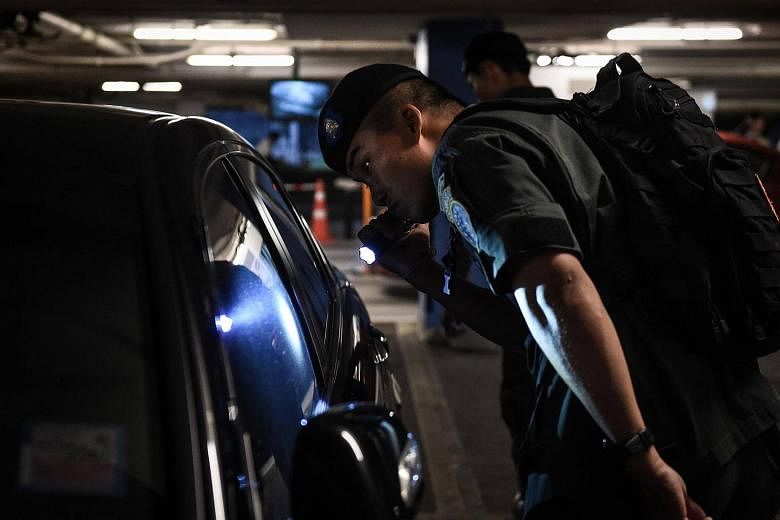In its editorial on Oct 13, the paper slams the police force for doing an inefficient job.
It would be far easier to accept the assurances of Metropolitan Police Bureau chief Sanit Mahathaworn about public safety in Bangkok in the face of this week's bomb warnings if his force were not so cagey about its investigation - and not labouring under a reputation for corruption and ineptitude.
The police lieutenant general insists there is no need to panic amid reports that persons unknown have been plotting to detonate car bombs in and around the capital this month, including at Suvarnabhumi International Airport.
Sanit has offered little in the way of details, but we do know that police, some in full Swat regalia, have been raiding buildings across the city.
Sanit said "inspections" were carried out in Nong Chok, Min Buri and Lat Krabang on Tuesday morning at dormitories, apartments and parking garages as a "precaution" - and that the public can rest assured about safety.
In what was billed as a "related development", police detained for questioning at least 10 young men from the far South who are living in Bangkok's Hua Mark and Ramkhamhaeng areas.
Nothing has been established to indicate this is in some way "related" to the bomb attacks allegedly being planned for October 20 through 25.
Nor have the authorities mentioned a possible connection between the bomb plot and the insurgency in the deep South.
The unfortunate truth is that the public cannot accept Sanit's assurances because police credibility is so low.
The force has only itself to blame for this predicament.
The public routinely witnesses instances of incompetence and corruption that undermine trust.
Poor communication and haphazard public relations only add to the perception that professionalism is sorely lacking.
Just days after the deadly bomb attack on the Erawan Shrine last August, Sanit's predecessor, General Somyot Pumpanmuang, sought to reassure citizens and the world that Bangkok was still entirely safe by taking the press on a tour of the red-light entertainment complex Nana Plaza.
Somyot and his lieutenants duly posed for a group portrait at the scene, evidently unaware that the neon bar sign above their heads made them look foolish.
"Suckers", it read. And, as if to establish for their global audience that this wasn't a Photoshop mock-up, the "news" picture was formally credited to the Royal Thai Police.
Sanit's inspection tour of disparate Bangkok addresses affords no more assurance than the red-faced red-light farce.
One location was a residence readily recalled from the Erawan bombing manhunt - the place where the bomb was believed assembled.
At another stop, several young men were arrested for possessing the mild intoxicant kratom.
The assembled reporters saw little apart from the sprawling police motorcade, Swat cops rushing into rooms and then casually strolling back out, and dozens of men in uniform standing about, contributing nothing but numbers.
This is the same police force that, confronted with the murder of 20 civilians in the Erawan Shrine blast, vowed to catch the culprits even as its officers were carelessly sweeping up the debris at the crime scene before a forensic examination could be conducted.
Crucial clues might have been discarded in the interest of quickly returning the scene to normal.
Normalcy, rather than law enforcement, appears to be the ultimate goal for Thai police.
The country is a tourist magnet, after all, so threats to tourism are swept aside like so much shattered glass.
After the Erawan Shrine attack - the worst such incident in the capital - if there is now a possibility of more bombs going off, tourists will be unimpressed by cosmetic adjustments and hollow reassurances.
There is no shortcut to normalcy. The police have to do their job better.
* The Nation is a member of The Straits Times media partner Asia News Network, an alliance of 21 newspapers.

